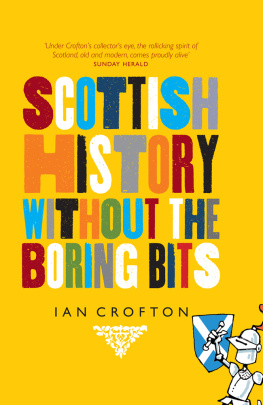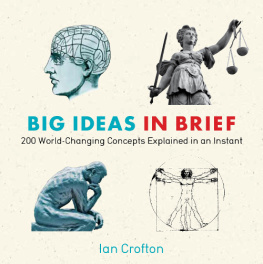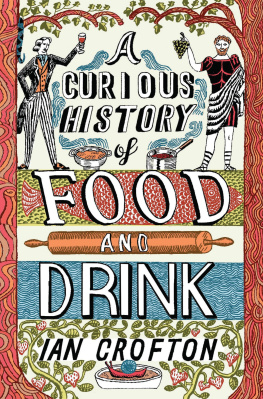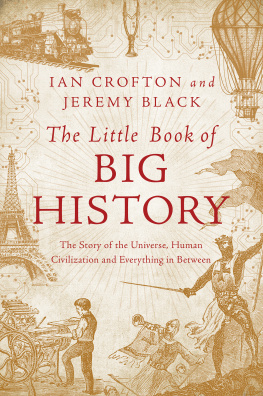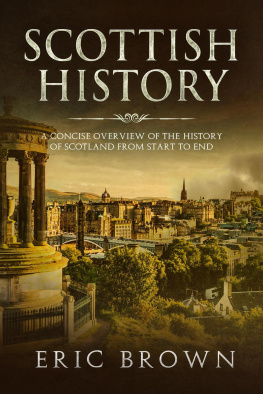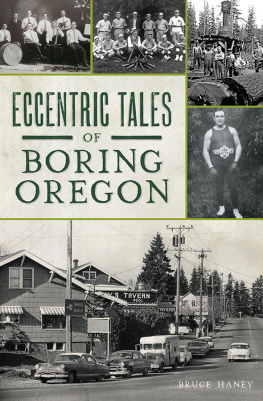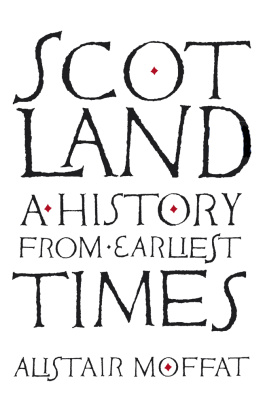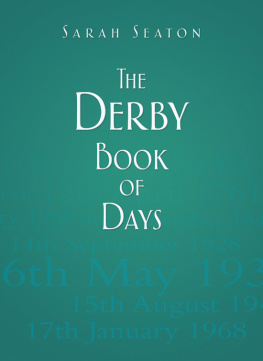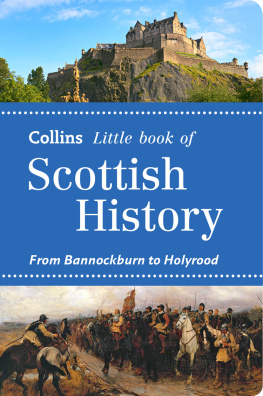Ian Crofton now lives in London, but was born and raised in Edinburgh. He has written many works of popular history, including History without the Boring Bits (now published in many different languages around the world, from Japanese to Estonian) and A Curious History of Food and Drink. For Birlinn he has also written A Dictionary of Scottish Phrase and Fable. In 2013 he made a journey on foot along the Anglo-Scottish frontier, and the resulting book, Walking the Border, was selected by the Daily Telegraph as one of its travel books of 2014.
First published in
Great Britain in 2015 by
Birlinn Ltd
West Newington House
10 Newington Road
Edinburgh
EH9 1QS
www.birlinn.co.uk
ISBN: 978 1 78027 265 8
eISBN: 978 0 85790 862 9
Copyright Ian Crofton 2015
The right of Ian Crofton to be identified as the author of this work has been asserted by him in accordance with the Copyright, Designs and Patents Act, 1988
All rights reserved. No part of this publication may be reproduced, stored, or transmitted in any form, or by any means, electronic, mechanical or photocopying, recording or otherwise, without the express written permission of the publisher.
British Library Cataloguing-in-Publication Data
A catalogue record for this book is available from the British Library
Designed and typeset by
Mark Blackadder
Printed and bound by Grafica Veneta
www.graficaveneta.com
CONTENTS
INTRODUCTION
As will swiftly become apparent, the present volume differs from most serious works of historical scholarship in a number of respects. Not the least of these is the fact that only a certain proportion of the events mentioned herein actually took place. The same might be said of its dramatis personae: not absolutely all of them did, in reality, breathe the air of Scotland (certainly not the monsters and mermaids, demons, changelings and familiars). I suspect few modern historians accept that St Serf did in reality hear the bleating of a stolen sheep from within the stomach of the suspected thief. Or that poor Bessie Dunlop, burnt as a witch, consorted with the Good Folk of Elfhame. Or that on 23 September 1954 a vampire with iron teeth stalked Glasgows Southern Necropolis.
Even if many of the events I describe did in fact take place, that does not necessarily mean they are historically significant. Significance is not the purpose of this book. Although many of the people and events herein are not important to our understanding of history, they may tell us something else, about the stories we tell ourselves about the past. Some such tales Bruce and the Spider, Sawney Bean, Rob Roy are so well known I thought it pointless to rehearse them again here. I have instead concentrated on digging up obscure little nuggets that throw some kind of curious sideways light on the nature and spirit of Scotland.
It may be that the present selection says more about the author than anything else. I have a tendency to suspect all those in authority of being rogues and hypocrites, and an associated penchant for pricking pomposity. I celebrate the bawdy and the subversive, the eccentric and the different, the put-upon and the misunderstood. I know I am not the only Scot to hold such attitudes, attitudes that run like a strong, pulsing vein through our history and culture. A hefty dose of snook-cocking lends vigour to our body politic, which might otherwise putrefy into a carcass reeking of piety, power lust, slack-jawed credulity and tut-tutting self-righteousness.
If all that sounds depressingly serious, I dont think that being depressingly serious is a thing this book can be accused of. I can only hope that the reader agrees.
Ian Crofton
February 2015
The DARK and MIDDLE Ages
3948 BC
SCOTS EXPELLED FROM PARADISE
According to Sir Thomas Urquhart of Cromarty, the year 3948 BC was the date that God created of red earth Urquharts own ancestor Adam, by whom he claimed to be descended 143rd by line, and 153rd by succession. Urquhart published his conclusions in 1652 in his Panto-chronachanon, subtitled A Peculiar Promptuary of Time. He initially follows the Old Testament genealogies (Enoch, Methuselah, Noah, Japhet, etc.), but by the late 3rd millennium BC wanders off into mythologies of his own creation. The year 2139 BC, he states, was the date of birth of Esormon, sovereign prince of Achaia: For his fortune in the wars, and affability in conversation, his subjects and familiars surnamed him OUROCHARTOS, that is to say, fortunate and well beloved. After which time, his posterity ever since hath acknowledged him the father of all that carry the name of URQUHART. Fortune in war and affability in conversation were qualities that Sir Thomas prized above all in himself: a dashing Cavalier, he fought for the Royalist side in the Wars of the Three Kingdoms, and published a succession of mock-scholarly works in which he floated a range of improbable notions, unfeasible inventions and even a new universal language (see 1653).
circa who knows when? BC
THE ORIGINS OF THE SCOTS IN SCYTHIA (OR GREECE, OR EGYPT, OR SPAIN)
According to some of the medieval chroniclers, the Scots had their origins in Scythia, the area of steppes north of the Black Sea whose nomadic, pastoral inhabitants were described by the ancient Greeks. The supposed peregrinations of these proto-Scots is described in the Declaration of Arbroath (1320):
From the chronicles and books of the ancients we find that among other famous nations our own, the Scots, have been graced with widespread renown. They journeyed from Greater Scythia by way of the Tyrrhenian Sea and the Pillars of Hercules, and dwelt for a long course of time in Spain among the most savage tribes, but nowhere could they be subdued by any race, however barbarous. Thence they came, twelve hundred years after the people of Israel crossed the Red Sea, to their home in the west where they still live today.
The earliest version of the story appears to be an 11th-century Irish manuscript, which relates that the Gaels were descended from the Scythian prince Fnius Farsaid, one of the 72 princes who supposedly had a hand in the construction of the Tower of Babel. Fniuss son Nl married an Egyptian princess called Scota (hence Scotia, Scotland, etc.), and they begot Godel Glas (Latinised as Gathelus), who was credited with creating the Gaelic language when God confounded the language of all the Earth. In the version concocted by the Scottish chronicler John of Fordun in the 14th century, Godel Glas becomes Gaythelos, a Greek prince who was exiled to Egypt, where he married the pharaohs daughter, Scota. They appear to have left Egypt for Spain at the time of the biblical plagues, and the subsequent death of the pharaoh and his army pursuing Moses and the Israelites across the Red Sea. Neither of these accounts is now generally accepted by historians.
AD 26
PONTIUS PILATE WAS A PERTHSHIRE LAD
Pontius Pilate became prefect of the Roman province of Judaea. There is a longstanding tradition that he was born in Fortingall in Perthshire, his father supposedly having been a Roman ambassador and his mother a local Menzies or a MacLaren. Whatever the truth of this, Fortingall has a more secure claim to fame in the form of the ancient Fortingall Yew, thought to be between 3,000 and 5,000 years old.
circa 380
CANNIBALISTIC CALEDONIANS

